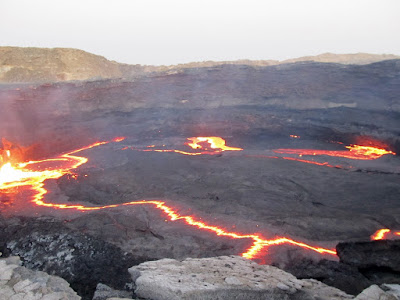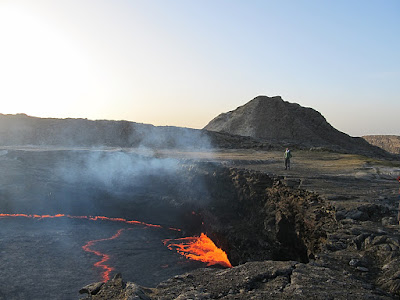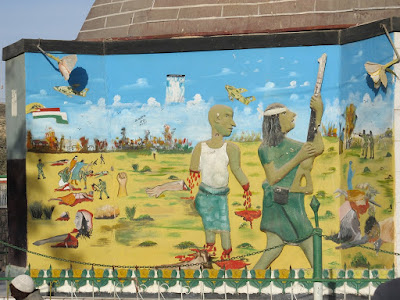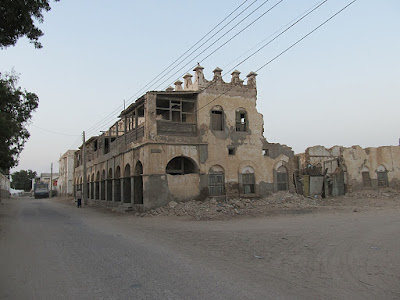After leaving early from Berbera and arriving in Hargeisa again without incident, I said goodbye to Charlie and Tyler as they left me for their journey back to Harar. I had some time to kill so went back to the police headquarters again to get permission to travel to Djibouti overland (something I didn't actually have to use in the end) and then found the area north of the city center where the 4WDs that go to Djibouti are.
Because the area is so hot during the day, transport leaves in the evening and drives through the night, arriving the following morning. The “road” is not a road at all but sand tracks and very rough. Much like the road to Moussoro in Chad only a lot longer and bumpier. They use old Landcruisers and pack them as full as possible. I was told 2 in the front seat, 4 in the back row and at least 6 in the rear section. After a few hours of waiting I thought I was going to be lucky because the 4 of us in the back row were all pretty small and so we fit rather easily. 10 minutes later we were in a furious uproar when they decided to squish a 5th in with us and put 3 in the front seat. 5 across does not work, don't try it at home. Whenever one of the doors got opened, whoever was on that side would literally pop out the door with the release of pressure. We couldn't really sit side by side, hip to hip, so the guy in the middle had to be scooted forward in the seat and turning his legs to the side to avoid the seat in front. He always chose to turn towards me, probably because he couldn't turn towards the girls on the other side. It was miserable. I'd tried to get the window but couldn't and us 3 guys had about 1/3 of the available leg room while the 2 girls had the rest. We were the first 4WD to leave Hargeisa at about 6pm.
 It looks like it could be fun...
It looks like it could be fun...

The "road".By 7pm I was uncomfortable and we were already stopping because the engine had a small issue and they'd have to stop and tinker with it (which became a common theme through the night)..
At 8pm we stopped to eat and I learned that the young guy sitting beside me was Djiboutian and spoke English really well because he'd studied IT in India. He bought me dinner and invited me to stay in his home when we got to Djibouti. I started to feel a little better about my prospects... He told me that pretty much everyone else in the Landcruiser (it was a very large group of women, girls and children) were Somalis from Mogadishu (they call all of Somalia proper Mogadishu I think) heading to the Djibouti border as refugees. He was convinced they would never cross.
At 9pm we were back on the road.
By 10pm I was nauseous and really regretting the big plate of spaghetti for dinner and had to focus all my energy on not getting car sick.
At 11pm we broke down enough that we had to wait 1/2hr on the side of the road (yay, I could try to rest with space and let my stomach digest) until one of the following 4WDs caught up to us and helped us out. It then promptly took off and disappeared ahead of us.
By midnight I knew any sleep at all would be hopeless. The road was so bumpy and/or soft that we were rarely going more than 20km/hr and I was tempted to believe that if you simply walked the route in a straight line you could actually make it faster than the trucks turning every 5 seconds onto a new sand track. I stared out the window in a daze and could see the sandy landscape under the light of a nearly full moon. I saw antelope, rabbits, fox and the occassional campfire of a nomadic camel herding family in the distance.
By 1am I was doubting my ability to survive, but had resigned myself to living the refugee life, fleeing to the border in the dead of night in miserable conditions....
By 2am my neck was sore from nodding off and cracking when we hit bumps I was not prepared for. My legs were completely cramped and my butt and back bruised (and were still hurting days later). The spaghetti had finally digested though so that was one less thing...
By 3am I was ready to run screaming into the desert and never set foot in or even see another car again or at the very least throw myself under the wheels to see if I could even feel anything anymore.
At 4am.... No, fortunately I have no recollection of 4am....
I recall at 5am thinking it was a bit ridiculous that I had 4 people leaning against me to sleep. One was from the area behind me. The guy in the middle beside me was leaning over in addition to having his legs completely squashing mine. The girl on the other side of him was trying to rest against his back but had slid all the way over to be against me too, and my new friend by the window, Jabril, was actually holding my arm and snuggling against my other shoulder. I never suspected I was so comfortable and comforting....
At 6am the rising sun did not improve our conditions nor help us to drive faster.
At 7am when the driver stopped for his breakfast at a collection of sandy lean-tos pretending to be a village, 5 crippled zombies fell out of the back row to go lay in the sand and try to rediscover their limbs. We were the last of 6 4WDs to arrive at the breakfast stop and the last to leave despite leaving first from Hargeisa.
At about 9:30am we finally made it to the border. Unlike the border with Ethiopia, this one was slightly more lively, slightly bigger and a more complicated. Crossing from Ethiopia was just a minor issue of stamping out and walking past a rope tied across the road and stamping into the next. At this one we had to leave the 4WD while it was inspected by customs and go to immigration on our own. The locals have to pay a departure tax, of $20 if they have a passport or 20,000 Shillings (about $3.30) if they don't. So they just hide their passports and say they don't have one and pay less tax. How that is a legit people control strategy I have no idea as there is no identity check at all.
That was the easy part. The part where everyone gets stuck comes after. The Djiboutian side is totally militarized in comparison. I say in comparison because I've seen truly militarized and nasty borders (the ones at Ceuta, Israel and North Korea instantly come to mind) but where the one with Ethiopia was so lax, it was a shock to see soldiers and rusting barbed wire on trying to enter Djibouti. This is because there are so many Somali refugees trying to cross. There were a large group of refugees stuck in no man's land and while I was getting stamped in on the Djibouti side a big truck of refugees under guard was being driven across from Djibouti back to Somaliland to get rid of some. They are very thorough in the customs inspection also so we had to wait a while for our truck to catch up to us. In the end it took about 2 hours to get across. I had no problems at all but of the ~20 people that started our journey from Hargeisa, only 3 (including me) made it into Djibouti.
Djibouti seems to be one of those countries that people have only heard of because it has a funny sounding name. It doesn't really do much and would rarely be in the news otherwise. I've heard it described by both other Africans as well as Europeans as the most fake and pointless country in Africa. It serves mainly 2 purposes, as the port country of Ethiopia and as a military outpost for everyone else. It was a French colony until 1977 but unlike it's other colonies in Africa or elsewhere, it was nowhere near any other French colonies and so it received relatively little attention and functioned mostly as a stop over to any of the other ones. In a region of instability Djibouti remained totally stable and intact because it housed such a large French military presence. I've been told that now the largest military here is American and it is supposedly the largest military base they have in Africa. The French and other Europeans are still here of course and there is even a Japanese air force base too. Djibouti is also known to be significantly more expensive than elsewhere in the region, approaching Arab Gulf state countries in price. Why? I do not know.
With these thoughts in mind I crossed into Djibouti, expecting to be greeted by a beautiful new road and somewhere clean and organized like the gulf countries.
Um...no. The road was still a mess though it was paved and did exist. Djibouti city, the capital, is only about 15km from the Somaliland border but to get there we passed garbage dumps, wrecking yards and then some military bases. First the US one and then the Japanese. Fighter jets patrolled the skies. We were dropped off at Jabril's family home, south of the city centre, 18 hrs after leaving Hargeisa.
After a much needed afternoon nap Jabril took me into the centre as the sun was setting. It's filthy, though not quite as bad as Somaliland. I was still shocked at how much litter there was and how disorganized and run down much of it looked. It has to be the most overpriced non-war torn country in the world. I can't see how they justify it. The old city centre and European quarter are quite small and it didn't take us long to see it, though mostly in the dark and with nothing much to specifically see. Djibouti city isn't exactly known as a tourist hotspot.
 The Hamoudi mosque, the oldest in Djibouti.
The Hamoudi mosque, the oldest in Djibouti.Djibouti is Muslim, it's part of the Arab League and it's official languages are French and Arabic. Jabril, like much of the population is not Arab (he's ethnically Somali) so doesn't speak any Arabic and French is his first language. This of course means that his French is too good and I can't understand any of it. It was much easier in Cameroon where it is an official language but still secondary to the tribal languages. Because of the military presence, there are lots of bars and French restaurants in town and some of the population is very “modern” with not all the girls covering their heads. It's kind of a weird mix actually because at first glance it does look very Muslim but the French influence has been strong here.
I met numerous members of Jabril's friends and family, ate good Djiboutian food and slept at his future brother-in-law's home. Thinking I'd gotten a pretty good deal I agreed to stay the following day as well, but we ended up just chilling in his brother-in-law's home and I didn't actually get to go out and see and do anything new. They had a bunch of friends come over and chew chat from lunch until well into the night. The chat culture is a little obsessive out here.
 Lunch with Jabril and his friends.
Lunch with Jabril and his friends.The following morning, with no real idea what I was doing, I followed Jabril's instructions of where to get off the bus and which direction to start walking to the port. My intention was to find a cargo truck to hitch back to Ethiopia with. Ideally I wanted the highway out of town but was directed by everyone straight to the port.
It didn't take long to get a ride but that truck ended up just taking me to a huge truck staging area several km out of town. There were well over 100 trucks there and the driver told me that since he had to wait for his paperwork to clear, I was better off finding someone leaving sooner. Because Djibouti is Ethiopia's port, all the trucks and drivers are Ethiopian, which means the truck stops are run by Ethiopians and they even use only Ethiopian currency for their transactions. The downside of this Ethiopian-ness is that I was instantly mobbed by touts wanting to sell seats on trucks for stupid amounts of money. Still 200km from the border, already sick of Ethiopians again and convinced I'd found one of the worst perversions of the concept of hitching, I started walking down the road in the direction of Ethiopia. At the very least I wanted to get past a nearby roundabout where someone would eventually stop and I'd be away from the tout interference.
What I hadn't counted on were the gendarmes sitting on the other side of the roundabout. I still have no idea what the difference is between gendarmes and police but I know I don't really want to deal with either under any conditions. They of course pulled me over and asked me what I where I was going. With a stupid grin on my face and pointing off into the emptiness ahead I said “Ethiopia???”. The look I received in return had me thinking I was about to be nominated for Stupidest Person of the Year by these guys. Of course I was not about to walk out into the empty desert in the hottest region of the world to get to Ethiopia but if they wanted to believe that then so be it. They decided to protect me from myself, even when I explained I was just about to hitch a lift from exactly that spot in one of the numerous trucks now passing us by because I had no money left and thus could not hire a car or fly. They were not convinced and were only confirmed in their suspicions that I was on a suicide mission when they found the Somaliland visa in my passport...
Wonder of wonders, the gendarmes actually decided to do something helpful for me for a change and walked me across the street to a different small truck stop and find/threaten a driver to take me....for free! The only driver there that spoke English got roped into the job but I still had to wait around a couple hours for his paperwork to clear. He was driving an old double tanker full of diesel and we were about the slowest thing on the road. But it was just the 2 of us and the leg room and view were glorious!
Not that there was anything to see but empty sand leading to low rocky hills with hardly any vegetation on either side of a relatively good tarmac road. The only traffic was cargo trucks and the only litter old, blown-out tires.
 Beautiful in a desolate kind of way?
Beautiful in a desolate kind of way?

A rough place to live... 2 hours and about 60km later we pulled off the road at a junction truck stop and the driver announced that he was done for the day. We ate and then he started to go to work on the chat and hooka in a serious way. As it was only 3pm, I was disappointed with our progress but fortunately he anticipated this and found a friend of his that was continuing and passed me off to him.
The new guy had a big single tanker full of diesel and a much newer truck so we head down the road at a much faster rate. He told me that 2000 trucks pass along the road every day and it's easy to believe it could even be more. Maybe that's the number crossing the border each day, but as it's a 2-3 day drive back to Addis Ababa from Djibouti for them, there must be even more strung along the entire distance. The entire economic livelihood of the 2nd or 3rd most populous nation in Africa (at 80 something million people) depends upon this continuous convoy of trucks. Thus the road has been redone (especially on the Ethiopian side, though it is still only a 2 lane road) though it is often still very narrow and with many turns so there are plenty of old wrecks lining the road. I saw 2 or 3 fresh accidents on that drive alone.
We arrived in some random truck stop town just before midnight and as there was nowhere to stay and no way to continue, I was given the trucker's bed in the cab, while he slept in a spare bunk bed in his friend's cab. Sweet.
At 6am we started off again and he dropped me off at a small bus station in Logiya, another town just a few km down the road from where we slept. The route I required from there was not a major one so only the occassional minibus does it. I was immediately touted in a retarded way and decided to start walking out of town to continue hitching. I was eventually picked up by another double tanker (I think the tanker drivers must be the nicest.) who took me another hour down the road to Mille, where the road splits 3 ways and all the trucks would continue on the wrong one for me as they all go to Addis.
There was of course no transport from that town at all, so I once again started walking out of town to avoid touts (I swear they just materialize out of thin air as soon as you go outside because they are everywhere, even the most random, no-tourist-could-possibly-end-up-here kind of place) until I was eventually stopped by a septic tank truck that was heading towards Mekele, my ultimate destination. He, of course, wanted money for the ride and already had 2 women as passengers. Starting to get fed up with all the hassle and realizing I was quickly running out of options, I gave in and accepted his offer as far as the next town, Woldia, on the main road north that we were trying to cut across towards. We never got there with him. A couple hours later he blew his back double tires and didn't have a tire iron to change them. We were stopped in the heat of the day on a beautiful new road with no traffic and a long way from anywhere. Typical.
He'd just flagged down one of the rare passing trucks to help him change his tire, when 2 guys in a UN WFP Landcruiser pulled up and offered to take the ladies and me to the junction to Woldia. They were also headed to Mekele, but said they weren't even allowed to have passengers but felt sorry for us since we were really nowhere and there would be no public transport passing by to save us. Yay, finally a free lift with the UN (non-flying)! I can check it off my list.
They got more sympathetic at the junction and after dropping off the ladies allowed me to continue further north with them. We ended up stopping and splitting up at Alamata as they decided they couldn't make it to Mekele that day. Alamata was a nice enough town to stop over for a night on my way to Mekele. From Alamata it was up and up and up into the mountains by psycho minibus. It's a good thing they don't get rain here or everyone would just fly off the cliffs on every corner... The highlands of Ethiopia really are beautiful though and Mekele has been surprisingly low in hassle factor so far. I am currently looking for last-minute tours to the Danakil Depression area from here.
 Heading up into the beautiful highlands again.
Heading up into the beautiful highlands again.If it sounds like most of my blogs are about transport lately it's probably because I've been spending a stupidly high percentage of my time moving around. I don't like the idea of having to move so quickly all the time and I could've spent longer in a few places, but this time I'm on a short trip and actually have a flight out on a specific date. I don't like having that kind of confirmed schedule but there is no real choice about it this time.
Ammon

















































